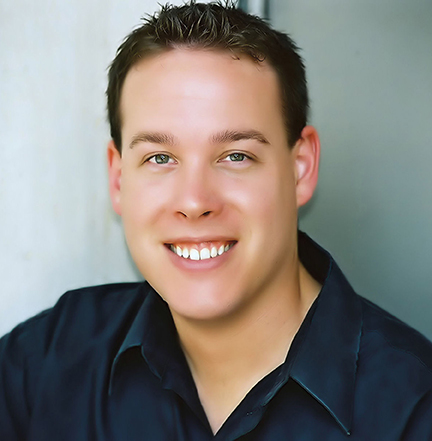
Third-year DMA student Dave Stamps, from the Glenn Korff School of Music, received an American Society of Composers, Authors and Publishers (ASCAP) Plus Award for 2013.
“It’s nice to be recognized,” Stamps said. “And it’s more incentive to keep building my catalog.”
Established in the 1960’s, the ASCAP Plus Awards program provides cash awards and recognition to writers who create music with a value beyond the scope of performance surveys. They are determined annually be a panel of distinguished music experts, who are neither members, no employees of ASCAP. Typically around 2 percent of ASCAP’s 147,000 members receive the designation.
“In contrast to many awards, where they evaluate a specific work, this is based on the catalog of work that you have compiled and how they perceive its future value,” Stamps said. “They also take into consideration the things you have been doing in the past year that may make the music more visible or accessible to people.”
Stamps has registered just over 20 of his compositions into his ASCAP catalog.
“Since I’ve been here, that’s been one of my main missions,” Stamps said. “My professor Dr. Eric Richards, because I’m active in the profession, felt it was important for me to diversify and build up my catalog, so we’ve been focusing on trying to get a strong portfolio—a nice, diverse group of tunes to put into the catalog.”
Richards was appointed supervising professor of Stamps’ doctoral program in jazz composition in 2011.
“As a doctoral jazz composer, Dave steadily creates compelling works for large and small jazz ensembles,” Richards said. “These pieces have been performed in major venues, such as the 2013 Jazz Education Network Conference. As a performer, he is a vital member of the UNL Jazz Orchestra and the Graduate Jazztet, and he remains active as a freelance trombonist and clinician in our region as well. I’m confident that his accomplishments are just a precursor to future significant contributions that he will make in the areas of composition, arranging, performing and teaching.”
Stamps’ father is a university professor, as well as a writer and trombone player. He used to tag along with his father when he taught summer classes and would spend time in the computer lab.
“They had the same notational software as we have now, but it was just much more basic,” Stamps said. “It still had the playback function, so I got a real big kick out of just taking piano sheet music and setting up my own band of instruments—maybe like a rock guitar and trombone and bass—and I would take the piano music and just plug in the notation into this and have it play it back to me with different types of instruments, so that spawned a curiosity.”
Though he began in performance, earning both a Bachelor of Music in jazz studies from Southern Illinois University and a Master of Music in Jazz Studies/Pedagogy from Northern Illinois University, he always wanted to write and has since shifted to jazz composition, earning both a Master of Music in jazz composition from the University of South Florida before pursuing his Doctor of Musical Arts in jazz composition at UNL.
“I’m much happier writing than being in a practice room,” Stamps said. “Not that it’s bad. It’s just funny how your preferences change over time. I love being able to create something exactly how I am hearing it. I felt as an improvising musician, I never thought I was quite able to do what I was hearing. I was getting close, but wasn’t quite able to do it. When you have the luxury of time and paper to put it down on, you can actually really try to capture what you’re hearing and find musicians who are able to realize it for you.”
An Othmer Fellow at UNL, Stamps directs the UNL Big Band, teaches jazz history and world music and coordinates the jazz chamber music program. His compositions have been performed and recorded by university and professional jazz ensembles worldwide. He recently presented a masterclass on jazz listening skills at the 2013 Jazz Education Network’s International Conference in Atlanta. He has also served in residency as guest faculty at the National University of Music in Bucharest, Romania, in both 2011 and 2013.
Previously, Stamps has served as the associate director of jazz studies and director designee of the UNC Jazz Press at the University of Northern Colorado, as well as the managing director of the Center for Jazz Composition and Visiting Assistant Professor at the University of South Florida, where, with composer Chuck Owen, he helped develop the Jazz Masterworks Series, the International Jazz Composers’ Symposium and the International Jazz Arranging Competition.
He hopes to complete his DMA next May.
“I’d love to teach,” Stamps said. “I’m in the process now of sending out applications and looking for employment. In the past, I’ve worked more on the music administration side of things and publication. I’d like to teach on a tenure-track type of position, but there are the parts of me that miss the administration part and coming up with projects and helping other people make projects happen, so I’m open to that again, too.”
He also plans to keep writing.
“It’s trying to figure out, while you’re trying to create your voice, staying active as an artist in the community and doing things,” Stamps said. “It can take some time to try to establish yourself. Regardless, if writing is the focus or if teaching is my focus, they’ll be somewhat interrelated.”